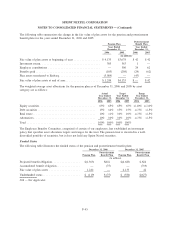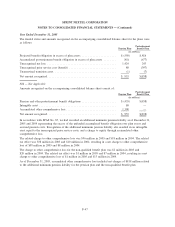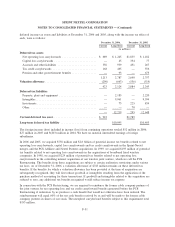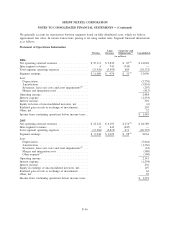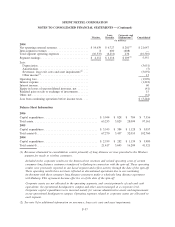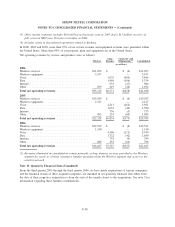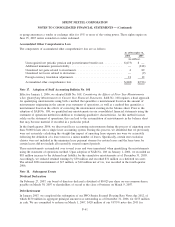Sprint - Nextel 2006 Annual Report Download - page 130
Download and view the complete annual report
Please find page 130 of the 2006 Sprint - Nextel annual report below. You can navigate through the pages in the report by either clicking on the pages listed below, or by using the keyword search tool below to find specific information within the annual report.A number of putative class action cases that allege Sprint Communications Company LP failed to obtain
easements from property owners during the installation of its fiber optic network in the 1980’s have been filed
in various courts. Several of these cases sought certification of nationwide classes, and in one case, a
nationwide class has been certified. In 2002, a nationwide settlement of these claims was approved by the U.S.
District Court for the Northern District of Illinois, but objectors appealed the preliminary approval order to the
Seventh Circuit Court of Appeals, which overturned the settlement and remanded the case to the trial court for
further proceedings. The parties now are proceeding with litigation and/or settlement negotiations on a state by
state basis. In 2001, we accrued an expense reflecting the estimated settlement costs of these suits.
Various other suits, proceedings and claims, including purported class actions, typical for a large business
enterprise, are pending against us or our subsidiaries. While it is not possible to determine the ultimate
disposition of each of these proceedings and whether they will be resolved consistent with our beliefs, we
expect that the outcome of such proceedings, individually or in the aggregate, will not have a material adverse
effect on our financial condition or results of operations.
Spectrum Reconfiguration Obligations
On February 7, 2005, Nextel accepted the terms and conditions of the Report and Order of the FCC which
implemented a spectrum reconfiguration plan designed to eliminate interference with public safety operators in
the 800 MHz band. Under the terms of the Report and Order, Nextel surrendered its spectrum rights in the
700 MHz spectrum band and certain portions of its spectrum rights in the 800 MHz band, and received
spectrum rights in the 1.9 GHz band and spectrum rights in a different part of the 800 MHz band and
undertook to pay the costs incurred by Nextel and third parties in connection with the reconfiguration plan.
Based on the FCC’s determination of the values of the spectrum rights received and relinquished by Nextel,
the minimum obligation incurred under the Report and Order will be $2.8 billion. We assumed these
obligations when we merged with Nextel in August 2005. The Report and Order also provides that qualifying
costs we incur as part of the reconfiguration plan, including costs to reconfigure our own infrastructure and
spectrum positions, can be used to offset the minimum obligation of $2.8 billion; however, we are obligated to
pay the full amount of the costs relating to the reconfiguration plan, even if those costs exceed that amount.
As a result of the uncertainty with regard to the calculation of the credit for our internal network costs, as well
as the significant number of variables outside of our control, particularly with regard to the 800 MHz
reconfiguration licensee costs, we do not believe that we can reasonably estimate what amount, if any, will be
paid to the U.S. Treasury. See note 7 for further information.
Operating Leases
We lease various equipment, office facilities, retail outlets and kiosks, switching facilities, transmitter and
receiver sites and spectrum under operating leases. The non-cancelable portion of these leases ranges from
monthly up to 25 years. These leases, with few exceptions, provide for automatic renewal options and
escalations that are either fixed or based on the consumer price index. Any rent abatements, along with rent
escalations, are included in the computation of rent expense calculated on a straight-line basis over the lease
term. Our lease term for most leases includes the initial non-cancelable term plus at least one renewal period,
as the exercise of the related renewal option or options is reasonably assured. Our cell site leases generally
provide for an initial non-cancelable term of five to seven years with up to five renewal options for five years
each.
F-53
SPRINT NEXTEL CORPORATION
NOTES TO CONSOLIDATED FINANCIAL STATEMENTS — (Continued)




